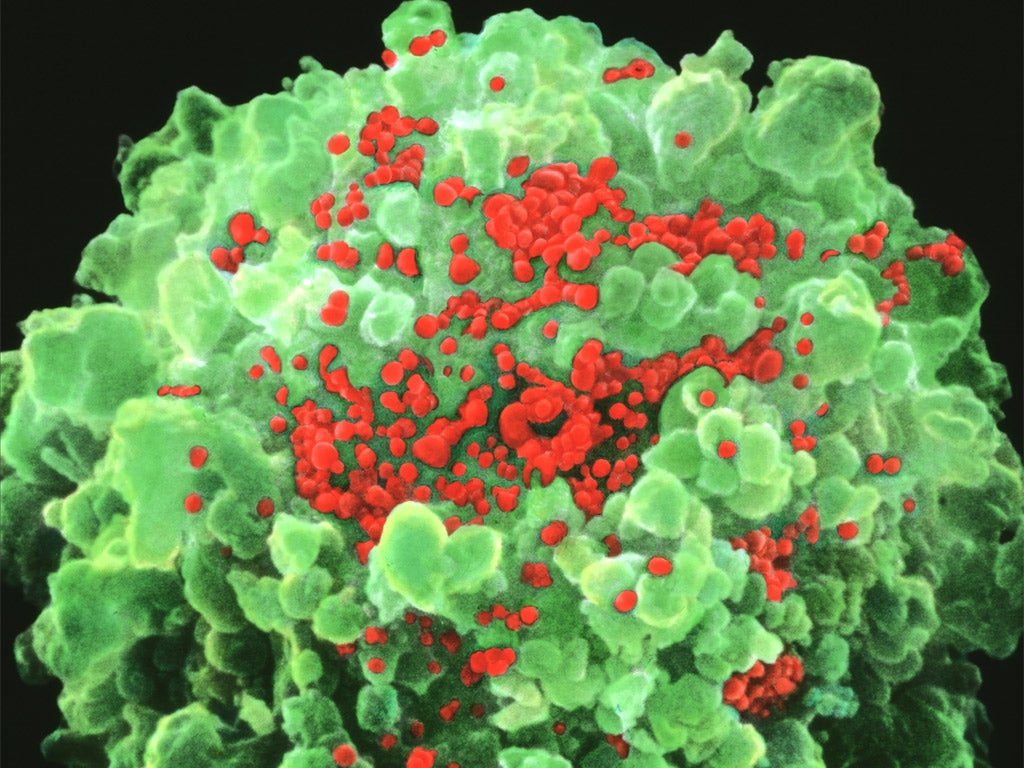HIV patients ‘cured’ of Aids suffer relapse
News 'disappointing but scientifically significant' as it shows that Aids virus persists even when sensitive blood tests fail to detect it

Your support helps us to tell the story
From reproductive rights to climate change to Big Tech, The Independent is on the ground when the story is developing. Whether it's investigating the financials of Elon Musk's pro-Trump PAC or producing our latest documentary, 'The A Word', which shines a light on the American women fighting for reproductive rights, we know how important it is to parse out the facts from the messaging.
At such a critical moment in US history, we need reporters on the ground. Your donation allows us to keep sending journalists to speak to both sides of the story.
The Independent is trusted by Americans across the entire political spectrum. And unlike many other quality news outlets, we choose not to lock Americans out of our reporting and analysis with paywalls. We believe quality journalism should be available to everyone, paid for by those who can afford it.
Your support makes all the difference.Two patients with HIV who were thought to have been cured of the Aids virus following treatment for blood cancer have suffered a viral "rebound" and have now returned to taking anti-retroviral drugs, doctors in Boston have announced.
Researchers at the Brigham and Women's Hospital in Boston said in July that they were unable to detect any signs of HIV in the blood of either patient about eight months after they had undergone a bone-marrow transplant for lymphoma cancer.
The doctors said at the time that the treatment may have resulted in a "functional cure" that eliminated residual pockets of HIV, offering hope that it may be possible to use this knowledge to find ways of ridding the virus totally from a patient's body.
Both men stopped taking anti-retroviral therapy in the spring, however one of the Boston patients began to show signs of an HIV rebound in August, while the second patient had a relapse in November. Both are now responding well to anti-retroviral drugs, said the hospital.
Timothy Henrich, a physician-researcher at the hospital said that the return of detectable levels of HIV in the two patients is "disappointing but scientifically significant" because it shows that the virus persists even when some of the most sensitive blood tests fail to detect it.
"Through this research we have discovered [that] the HIV reservoir is deeper and more persistent than previously known and that out current standards of probing for HIV may not be sufficient to inform us if long-term HIV remission is possible if antiretroviral therapy is stopped," Dr Henrich said.
"We have also learned that there may be an important long-lived HIV reservoir outside the blood compartment. Both patients have resumed therapy and are currently doing well. I am thankful for their commitment to research and our shared dedication in understanding this virus to benefit all HIV patients," he said.
The Boston patients have been compared to Timothy Brown, the "Berlin patient", who was also "cured" of HIV following a different type of stem-cell transplant to treat leukaemia. The donor of the transplanted bone marrow also carried a specific mutation known to interfere with HIV's ability to infect white blood cells.
Mr Brown, who now lives in San Francisco, received the transplant in 2007 and appears to remain free of detectable levels of HIV in his bloodstream. However, his transplant carries a high risk of death and is considered too dangerous for widespread treatment of HIV-Aids, scientists said.
In the case of the two Boston patients, the transplanted bone marrow came from ordinary donors. One of the men received his bone-marrow transplant in 2008 while the other had his in 2010 - and both stopped taking antiretroviral drugs in earlier this year before suffering viral rebound.
Brigham and Women's Hospital said: "Physician-researchers will continue to monitor the patients and continue to measure their HIV levels as part of a new study of the very early initiation of anti-retroviral therapy after HIV rebound."
The only other case of a "functional cure" for HIV is a baby in Mississippi whose mother was infected with the virus but did not realise it until she was in labour.
The baby, who was also infected, was given anti-retroviral drugs within hours of birth and has remained free of the virus for the past three years. Doctors, however, now prefer to describe the baby as being in "remission" rather than being "cured".
Join our commenting forum
Join thought-provoking conversations, follow other Independent readers and see their replies
Comments